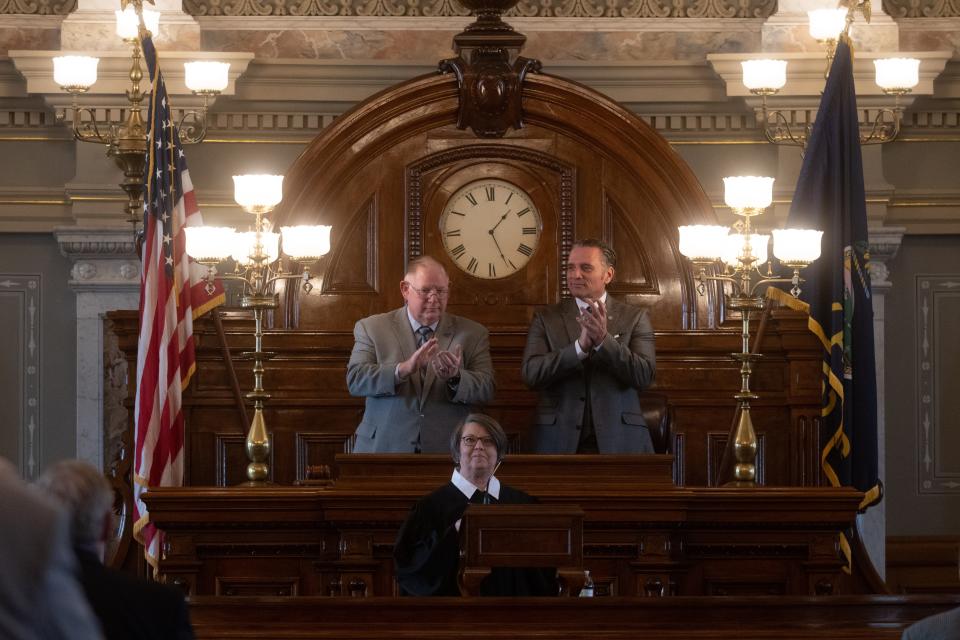As officials ponder state of Kansas courts, judicial selection, abortion battles remain

Moments after briefing a joint session of the Legislature on the state of the Kansas judiciary Wednesday, Chief Justice Marla Luckert declined to wade into a brewing battle over how justices on the state Supreme Court should be selected.
Republican lawmakers and Attorney General Kris Kobach have said they again wish to pursue a constitutional amendment to move Kansas from its current merit selection system to one that would require appointees be confirmed by the Kansas Senate.
The Kansas Supreme Court has become a touchpoint for political debate in recent years. Rulings that have required the Legislature to spend more on education to meet constitutional requirements and protect abortions rights in Kansas have frustrated Republicans.
More:Kansans voted to keep their judges. But the state's high court will once again be in spotlight.
Judicial selection fight unlikely to go away in Kansas
The battle was not directly addressed in Luckert's annual state of the judiciary address, with the chief justice instead focusing on the judicial branch's work to address a shortage of attorneys in rural areas, strengthen behavorial health services and boost judge pay.
But speaking with reporters after the address, Luckert said "that's a policy decision for the Legislature and the people of Kansas."
"I think that that is the key question," she said. "I think that voters will have to decide for themselves."
Kobach, who was in attendance for the address and reiterated his belief in changing the judicial selection process during his campaign for attorney general, said he was not surprised Luckert didn't wade into the matter.
"To be sure, that does have something to do with administration of the courts," he told reporters. "It is also a contentious issue. So, I think she was staying away from the fights, so to speak."
But Kobach said he had no desire to follow suit.
"I've continued to believe that we should move to a different model of judicial selection," he said.
No formal legislation has been introduced on the matter this session, though a vote in the Kansas Senate to approve a constitutional amendment to move to Senate confirmation failed last session.
A separate proposal from Rep. Brett Fairchild, R-St. John, has been introduced to make it easier to impeach justices, another potential option for attempting to change the high court's composition.
Abortion battle remains active, putting high court at the center
Frustration with the justices has centered on a 2019 ruling that established state constitutional protections for abortions, a verdict that anti-abortion activists tried and failed to undo with a proposed constitutional amendment on the August ballot.
In a metaphor for the larger friction with the courts, two anti-abortion protesters stood outside the Kansas House chambers where Luckert addressed legislators with signs urging that "abortion must be abolished, not regulated."
Luckert rejected the assertion that the failed constitutional amendment vote was in any way vindication for the high court.
"Vindication is not a part of my job. My job is to uphold the law," she said. "And regardless of what that vote did, I made my legal decision based on that."

A top Republican lawmaker, Senate President Ty Masterson, R-Andover, has said he believes the legal basis for the 2019 decision, the right to personal autonomy under the Kansas Constitution, needs to be tested to see if the unborn have legal protections under that standard.
"I think probably the biggest question to be answered goes to autonomy," Masterson said at a Statehouse news conference Tuesday. "Which is, when does the young lady in utero receive her autonomy and what are the rights of that person? I think there are questions that need to be asked. So, we just need to evaluate what that looks like."
Luckert made no prediction as to whether such a case might be proffered. A court fight is currently ongoing over a state ban on telemedicine abortions, with a Shawnee County District Court judge putting the law on pause in a November ruling as the case plays out.
Despite some rumblings that anti-abortion groups would carry out a robust effort to prompt voters to not retain the six Kansas Supreme Court justices on the November ballot, only a modest campaign emerged in opposition.
Luckert said she believed the retention vote, with all six justices approved by substantial margins, was a sign that voters were happy with the status quo.
And while she was not thrilled with the reason why the Kansas Supreme Court was making headlines, Luckert did say she felt it was important that residents understand the nature of the state's judicial system.
"I don't think people really have an understanding of how the courts impact their daily lives and those of their communities and their neighbors," she said. "And so, I do think it's important that they become educated about what courts do and all of the programs that we have in our efforts to strengthen Kansas communities."
This article originally appeared on Topeka Capital-Journal: Kansas lawmakers are pondering a new legal battle over abortion

 money
money 